The Syrian visual artist Dareen Abbas explores how physical environments affect the inner self, like in the production Broken Shapes. You will have to wait a little longer for the première, which should normally have taken place at the Kaaistudios, but that is no reason to deprive you of our visit to the changing space in which her creations are formed.
Dareen Abbas: 'My workspace changes all the time'
Also read: In the cabin of Cabane
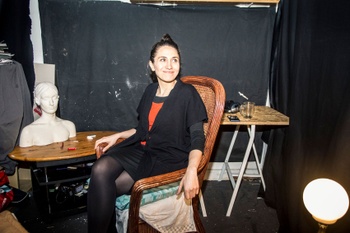
© Heleen Rodiers
Dareen Abbas
- Born in 1989, grew up in the Syrian capital Damascus
- Studied engraving in her homeland and then completed a residency in performance in Beirut
- Came to Brussels when she was 24, where she obtained a Master's from the ERG School of Graphic Research
- Took part in the Taipei Biennale in 2016, and the Wiels residency programme in 2017
- Created videos, a sculpture, and the sets for Broken Shapes, a collaboration with the Palestinian theatremaker and author Rimah Jabr
- In July, she will exhibit a combination of sculptures made during her residency and audio-visual work from Broken Shapes at Wiels
The ceiling and several walls in the private room to which Dareen Abbas (30) leads us are covered with black sheets. In the five years since she moved into several rooms in this spacious town house in Laken/Laeken, it has successively been a reading and research space in which she evaluated the viability of future projects, a black box in which she made sculptures and experimented with video, and a tent in which she now comes to rest and reflects.
“My workspace changes all the time,” the artist tells us. Her sculptural and graphic work, in this case mostly videos, will soon be featured in a new production with the theatremaker and author Rimah Jabr. The Palestinian artist has become a close friend of Abbas's since she moved to Brussels six years ago. They decided that they wanted to work together three years ago.“Rimah was one of the first people I ran into here and we soon became interested in one another's work. I like the sensitivity with which she approaches language; at one moment she is very careful and thoughtful and then suddenly spontaneous and raw.” As the daughter of a sociologist and an engineer with a love of literature who once translated poetry from Greek to Arabic, it doesn't come as a surprise.
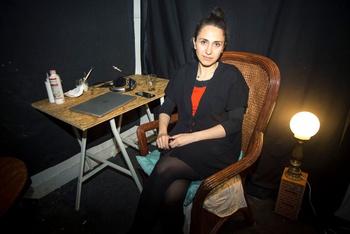
© Heleen Rodiers
I always think in terms of matter and its emotional content
Light, poetry, mystery
The new joint production, Broken Shapes, tells the story of a young woman in an occupied city. On the day of her father's funeral, she discovers his architectural drawings, which make her start fantasizing. “It is not about architecture in the narrow sense, but about spatial experiences, about how you can express something through the things that surround it, and how you can thus construct a parallel universe. And it is certainly not only about our backgrounds. They are present in our work because it is simply impossible to step out of reality, but I also want to explore whether we can create meaningful and universal work here, outside our homelands.”
Broken Shapes is Abbas's first foray into the medium of video. Nevertheless, the result is an extension of The Sand Clock, the installation that she made for the Taipei Biennale, and of which the mould still stands here on a table. “The cinematographic experience continues to be central,” she says. What that means precisely cannot be described other than by saying that, for example, light and poetry coalesce into something mysterious. “I always think in terms of matter and how it covers an emotional content. I let a living experience blend with the material world, which might consist of sand, water, or light. Or in other words, I materialize experiences.”
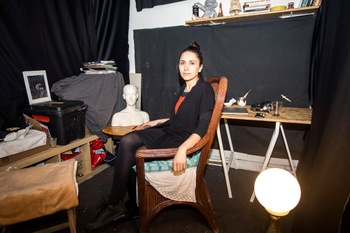
© Heleen Rodiers
I first collect my material, do research and read, and then learn a great deal from the people I collaborate with
Abbas also describes her new work as fragmented and layered, and it has similarities with film noir – “I always want to make a film in preparation for my projects, but always end up with something else” – and she explains her fascination with gravity. When we ask her about inspirations, she mentions Francis Bacon – “I never get tired of looking at his paintings” – and the German expressionists. “Like many of my fellow artists back in Damascus, I was obsessed with them for a while, strangely enough.” Though she completed several fine arts programmes, she says that she is primarily an autodidact. “I first collect my material, do research and read, and then learn a great deal from the people I collaborate with.”
“When I came here to do my Master's, I wanted to shift my artistic practice. I have always vacillated between the disciplines, between visual work and cinema. At a certain point, merely making a sculpture was not enough. I often thought about how certain objects would look if they were photographed. By looking at them through a camera, the objects changed. I thought that was very interesting. In a lot of my older work, the camera was always present like a kind of fictional machine. In my more recent work, it is also genuinely present. But I enjoy myself most between those two perspectives.”
BROKEN SHAPES
This week's première at Kaaitheater has been postponed. The new dates are yet to be confirmed.
www.moussem.be
www.kaaitheater.be
Read more about: Podium , playground
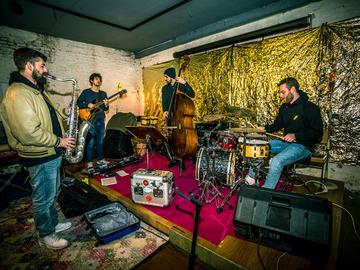
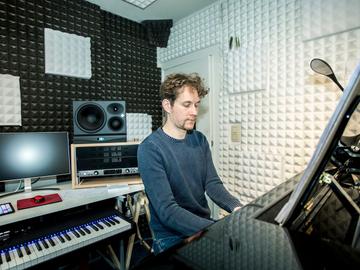
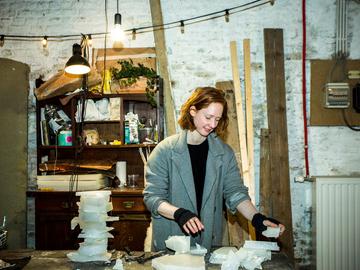
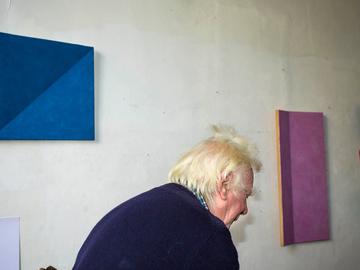
Fijn dat je wil reageren. Wie reageert, gaat akkoord met onze huisregels. Hoe reageren via Disqus? Een woordje uitleg.